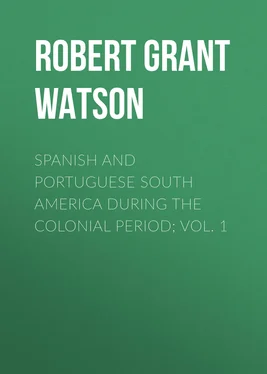Robert Grant Watson - Spanish and Portuguese South America during the Colonial Period; Vol. 1
Здесь есть возможность читать онлайн «Robert Grant Watson - Spanish and Portuguese South America during the Colonial Period; Vol. 1» — ознакомительный отрывок электронной книги совершенно бесплатно, а после прочтения отрывка купить полную версию. В некоторых случаях можно слушать аудио, скачать через торрент в формате fb2 и присутствует краткое содержание. Жанр: foreign_prose, История, foreign_edu, foreign_antique, на английском языке. Описание произведения, (предисловие) а так же отзывы посетителей доступны на портале библиотеки ЛибКат.
- Название:Spanish and Portuguese South America during the Colonial Period; Vol. 1
- Автор:
- Жанр:
- Год:неизвестен
- ISBN:нет данных
- Рейтинг книги:5 / 5. Голосов: 1
-
Избранное:Добавить в избранное
- Отзывы:
-
Ваша оценка:
- 100
- 1
- 2
- 3
- 4
- 5
Spanish and Portuguese South America during the Colonial Period; Vol. 1: краткое содержание, описание и аннотация
Предлагаем к чтению аннотацию, описание, краткое содержание или предисловие (зависит от того, что написал сам автор книги «Spanish and Portuguese South America during the Colonial Period; Vol. 1»). Если вы не нашли необходимую информацию о книге — напишите в комментариях, мы постараемся отыскать её.
Spanish and Portuguese South America during the Colonial Period; Vol. 1 — читать онлайн ознакомительный отрывок
Ниже представлен текст книги, разбитый по страницам. Система сохранения места последней прочитанной страницы, позволяет с удобством читать онлайн бесплатно книгу «Spanish and Portuguese South America during the Colonial Period; Vol. 1», без необходимости каждый раз заново искать на чём Вы остановились. Поставьте закладку, и сможете в любой момент перейти на страницу, на которой закончили чтение.
Интервал:
Закладка:
We have seen so far the results of the policy of Pedrarias and his lieutenants as regards the inhabitants of the Isthmus. We have now to turn to his treatment of the most capable and distinguished Spaniard within the colony, namely, the Adelantado Vasco Nuñez de Balboa. In the midst of the general gloom in which the settlement of Darien was enveloped, Pedrarias was continually haunted by the fear that the able Adelantado would one day oust him from his office. Had the choice of a leader depended on the people, he knew that Nuñez would have been elected by acclamation; and he had but recently received proofs of the high estimation in which his services were regarded by the king. He was further aware of the gloomy tales of misrule and consequent misery which were being constantly sent to Spain with reference to his own government. Whilst Pedrarias was in this frame of mind, a new idea was presented to him by Bishop Quevedo, the fast friend of Nuñez, who suggested a matrimonial alliance between the Adelantado and the governor’s daughter. The suggestion seemed to be a happy one and was readily accepted by both parties, a regular contract being entered into, and the young lady being sent for from Spain.
1516.
Vasco Nuñez was now the ally of the governor, whose jealousy was lost sight of in his desire to further the interests of his daughter’s future husband. Nuñez was authorised to build brigantines and to make the necessary preparations for an expedition of discovery on the Southern Sea. A town named Acla was founded at a point to the west of Darien , whence there was supposed to be the most convenient route across the mountains. Here Nuñez commenced his operations, having two hundred men placed under his command and being aided by an advance from the treasury. He was also assisted with funds by a notary of Darien , named Hernando de Arguello. Nuñez pursued his undertaking with his accustomed energy, and had in a short time constructed the materials of four brigantines. The timber was felled in the forest of Acla , and was then, with the anchors and rigging, transported to the opposite shore of the Isthmus. On this service were engaged Spaniards, negroes, and Indians. As there were no other roads save Indian paths through the primeval forests or up the rugged defiles, the work of transportation was similar to that with which the journals of Mr. Stanley in Africa have made us familiar in our own day. Many of the Indians perished over the task; but at length the ponderous loads were conveyed to a river which flowed into the Pacific.
Even then the labours of Nuñez and his men were far from being complete; for, with all their trouble, the Spaniards found that the timber which they had brought at such cost of labour and of life was useless, being worm-eaten from having been cut near salt water. They were obliged, therefore, to fell trees near the river and begin their work afresh. But the perseverance and good management of Nuñez at length overcame every difficulty. As food was scarce he divided his people into three bands, assigning to one the task of foraging for provisions, to another that of cutting and sawing the timber, and to the third that of bringing the rigging and the ironwork from Acla .
The patience of the working party was still further to be tried; for when the rainy season set in, the river rose so rapidly that the workmen had barely time to save their lives by climbing the nearest trees. The wood on which they had expended so much labour was either buried out of sight or carried away by the torrent. The same cause prevented the foraging party from returning with food; and the workmen were thus reduced to feed on roots. In this extremity the Spaniards owed their relief to the ingenuity of the Indians, who contrived to fasten a number of logs together, thus making a floating bridge on which they were able to cross to the opposite bank, where they procured provisions.
When the river had subsided, the workmen resumed their operations; and, after immense toil, Vasco Nuñez had the satisfaction of seeing two of the brigantines afloat on the river Balsas . As soon as they could be fitted and manned for sea, he embarked in them with his companions on the mighty ocean which he had been the first European to discover. His first cruise was to the Pearl Islands, on one of which he disembarked the greater part of his men, sending back his vessels for the remainder. On their arrival, taking a hundred men with him, he set out on a reconnoitering cruise to the eastward, in the direction to which the natives pointed as being that of the land which abounded in gold. Nuñez and his party sailed for about twenty leagues beyond the Gulf of San Miguel , the seamen being alarmed at the number of whales which they met with. On this account he anchored for the night, intending to continue his cruise in the same direction next day. But when daylight came the wind had changed, whereupon he steered for land. It was at the point where a party of Spaniards under Morales had recently been massacred; and as the Indians were disposed to fight, Nuñez took vengeance upon them for the slaughter of his countrymen, after which he re-embarked and returned to Isla Rica .
Nuñez resolved to build his remaining brigantines at this island, and accordingly despatched men to Acla to bring the necessary rigging. It was at this time that a rumour reached him of the appointment of a new governor to supersede Pedrarias. His relations with the latter were now so good that he was not a little disturbed by the rumour in question, since it was possible that the new governor might put a stop to the exploring expedition which he contemplated, or might entrust the command of it to some other person. Under these circumstances, he held a consultation with some of his friends as to what had better be done, and the fact that part of this conversation was overheard by a sentry who had taken refuge from the rain in the verandah of Nuñez’ house, had an important bearing upon the fate of that cavalier. It was agreed that a trusty person should be sent to Acla , seemingly on business. Should he find that there was no foundation for the rumour of the coming of a new governor, he was to explain to Pedrarias the progress of their operations, and to request further assistance. In the opposite event he was to return forthwith to Isla Rica ; for in that case it had been determined that Nuñez and his party should put to sea at once on their expedition of discovery.
The messenger chosen to go to Acla was Garabito, the same who had been sent by Nuñez to Cuba for recruits. It is stated that this man was possessed by a secret enmity to Nuñez, on account of having been discovered and rebuked by the latter for his attentions to the daughter of the Cacique Careta, who all this time had lived with Nuñez, and to whom he is said to have been much attached. It is even said that Garabito in his jealousy went so far as to send an anonymous letter to Pedrarias, stating that Nuñez had no intention of marrying his daughter, and that he was merely playing a part to gain time. It is certain that Garabito, on his arrival at Acla , basely betrayed his confiding friend.
A new governor had indeed been sent out from Spain to supersede Pedrarias; but he had died in the harbour of Darien . From Garabito Pedrarias had no difficulty in extracting all the information which he possessed, and, further, all that he conjectured respecting the plans of Nuñez. In fact, the suspicions of the jealous old governor had been thoroughly aroused afresh. The latter had made a lamentable mistake in allowing so long an interval to elapse without sending to his chief a report of the progress of his expedition, and there were not wanting at Darien jealous and mischief-making persons still further to irritate the governor’s mind against him.
Читать дальшеИнтервал:
Закладка:
Похожие книги на «Spanish and Portuguese South America during the Colonial Period; Vol. 1»
Представляем Вашему вниманию похожие книги на «Spanish and Portuguese South America during the Colonial Period; Vol. 1» списком для выбора. Мы отобрали схожую по названию и смыслу литературу в надежде предоставить читателям больше вариантов отыскать новые, интересные, ещё непрочитанные произведения.
Обсуждение, отзывы о книге «Spanish and Portuguese South America during the Colonial Period; Vol. 1» и просто собственные мнения читателей. Оставьте ваши комментарии, напишите, что Вы думаете о произведении, его смысле или главных героях. Укажите что конкретно понравилось, а что нет, и почему Вы так считаете.












